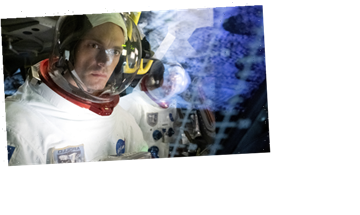SPOILER ALERT: Do not read if you have not yet watched the first three episodes of “For All Mankind,” streaming now on Apple TV Plus.
When Ronald D. Moore was five years old, he looked up at the moon and asked his mom, “Why can’t I see the astronauts up there?”
Moore recalls being whisked into his family living room with his young brother and sitting transfixed in front of the black-and-white TV, as Neil Armstrong took his one small step.
2019 is the 50th anniversary of the Apollo 11 moon landing, which makes Moore’s latest space-based adventure, Apple TV Plus’ “For All Mankind,” even more timely. The new drama centers on the question of how NASA would have reacted if the Soviet Union had put a man on the moon first?
Moore says he was approached directly by Apple TV Plus co-chief Zack Van Amburg about making a project set inside the walls of the NASA space program during the 1970s. However, as Moore points out, the story of NASA in that decade is a “sad” one, as the agency was hit with a series of budget cuts and riddled with “diminishing expectations and lowering ambitions.” Moore knew he needed to add a little rocket fuel to propel a potential series into orbit, hence the alternate history approach.
“I went back to Zack and said instead of doing a show about what really happened in the 70s, why don’t we do a show that’s about the space program you and I thought we were going to get when we were kids? A much bigger, expanded, bolder program, so I thought let’s do an alternate history show,” he says.
Part of Moore’s plan involved ramping up the sense of competition between the U.S. and the Soviet Union. Not only do the Soviets put a man on the moon first in “For All Mankind,” they also beat the Americans to have the first woman set foot on the lunar surface, triggering a mad dash on NASA and the Nixon administration’s part to start a female astronaut’s program from scratch.
“In the alternate history, we wanted to recapture that feeling where the Americans were constantly banging their heads against the wall about to how the Soviets keep beating us at every turn, that motivated a lot of the things in the original space race, and it motivates the show to go further and have a lunar base and going beyond all that,” Moore says.
“For All Mankind” features a mélange of actors portraying real-life astronauts, including Armstrong (Jeff Branson), Aldrin (Chris Agos) and Collins (Ryan Kennedy), as well as NASA’s astronaut office chief Deke Slayton (Chris Bauer) and Marshall Space Flight Center director Wernher von Braun (Colm Feore), alongside a core cast of fictional characters.
Moore admits it would have been “very difficult to erase Armstrong, Aldrin and Collins from history,” so he made the decision to play the astronauts and engineers as close to their real-life selves as possible in order to “keep the show tethered to real life” and not glorify them as a standard issue biopic might do.
“They can still be heroes, but they don’t have to be carved out of marble,” Moore says.
The show really hits its stride when the female astronaut program kicks in, a program which helps the “push for women’s rights in the work place” and launches the group of four astronauts who emerged from the program to “hero status,” according to Moore.
As “For All Mankind” progresses, a family of Mexican immigrants becomes a key component to the story, as well, with father Octavio Rosales (Arturo Del Puerto) keeping momentos and scraps from working as a janitor at NASA to give to his space-obsessed daughter Aleida (Olivia Trujillo).
Just as Aleida casts her eyes to the moon and the stars in wonder, so did Moore all those years ago. Watching Armstrong take those first steps onto the Moon’s surface instilled in him a lifelong love of all things galactic and forged his career path to the stars.
“My little brother literally took his very first steps that night, walked across the floor for the very first time at the same time Armstrong walked on the Moon,” Moore recalls. “It changed my life, they were broadcasting the Apollo missions during the day and at night I would want to watch anything with a space ship on TV, and that led me to ‘Lost in Space’ and eventually to ‘Star Trek’ and now this ‘For All Mankind.’”
Source: Read Full Article
